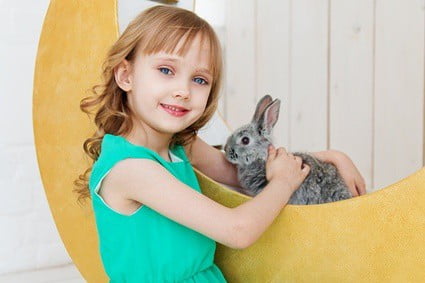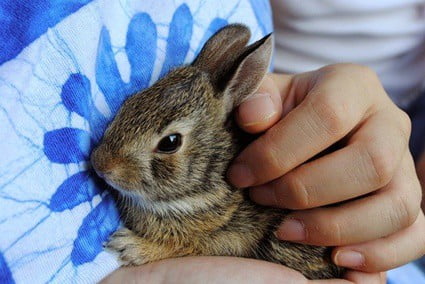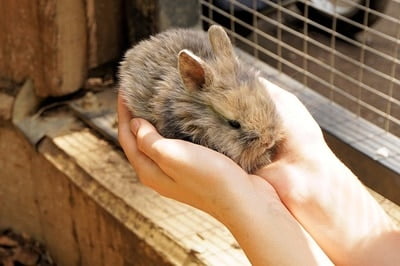As an animal that forms strong social bonds, a rabbit will actually rely on having a favorite person. It will grow to recognize its owner through repeated interactions. So long as these interactions are positive and the rabbit’s affections are returned, the bond will grow and strengthen.
Rabbits pick a favorite person based on interactions outside of basic care. This means playing, cuddling, and grooming the rabbit. Bunnies that receive this will grow very affectionate, licking and nibbling, binkying, flopping, and cuddling. Be sure to not reject these behaviors, as the rabbit will take the rejection hard. Responding positively – with pets, cuddles, and verbal affirmation – will ensure that your bond with the rabbit grows.
Strengthening your bond requires time and patience, especially if you’ve only recently brought the rabbit into your family. It will need a settling-in period, where it can explore its new home and become accustomed to you. Once the rabbit is comfortable, you can start creating a bond.
Do Rabbits Bond With Humans?
The rabbit isn’t only beloved as a pet because of its adorable appearance and relatively easy care. It’s also a domestic animal that’s well-known for forming a tight bond with its owner. Once bonded, a rabbit will recognize its owner by smell, sound, and sight.
Bonding with your rabbit means more than creating an affectionate relationship with it. It means creating a healthy mental environment. Rabbits rely on social bonds heavily. One without healthy bonds will likely become depressed and lonely, which can lead to destructive behavior.
It’s important for you to bond with your rabbit, especially if it does not have a companion bunny to fulfil this need. This allows it to exercise its normal social behavior, so that it can act peacefully and happily in your home. By letting it bond with you over another rabbit, this also ensures you gain more of its attention. Otherwise, a rabbit’s owner will usually play second fiddle as the favorite companion.
A bonded rabbit pair will prefer each other over humans, even if their owners are responsible for food and care. This doesn’t mean you won’t get affection from either rabbit, of course. Rabbits that live in groups will still be very affectionate with their owners. If you want their undivided attention, however, solo interactions are best.
Do Rabbits Bond with One Person?
A rabbit can form a bond with more than one person. The strength of this bond will depend on the relationship that each person builds with the rabbit. For example, what if Person 1 feeds, grooms, and pets the rabbit every day, but Person 2 pets it every other day? Person 1 will have a much stronger bond with the rabbit than Person 2.
Another scenario is if Person 1 has owned the rabbit since it was old enough to be adopted. Meanwhile, Person 2 appeared much later in the rabbit’s life. Unless Person 2 takes over the primary care of the rabbit and spends significantly more time with the pet, Person 1 will still be the favorite.
There are occasions where, despite being provided with equal attention from two people, rabbits prefer one human over the other. Frustrating as it may be, it does happen. This may be decided by arbitrary reasons or by seemingly random chance. For example, the rabbit may prefer the smell of one person, or find the movements of another person less threatening.
In any case, rabbits often come from large colonies. As such, they’re capable of forming multiple bonds. This bond may be of equal strength with each individual, or it may vary.
Do Rabbits Get Attached To One Person?
A rabbit that has bonded with you will be relaxed and friendly in your company. A rabbit that’s truly attached will be far more affectionate and actively seek you out.
Rabbits do appear to become attached to one person once a bond has formed. The formation of this bond takes time, patience, and no small amount of work. However, an attachment requires a bit more time.
New rabbits can take anywhere from a few weeks to a few months to form an attachment to their owners. As inherently cautious creatures, it takes many interactions for a rabbit to recognize a human as ‘not a threat’. After this, it will take many more interactions for an attachment to form. At this stage, the rabbit will not only view you as non-threatening, but as its family.
Building this connection is a rewarding experience. Gradually seeing the rabbit come to enjoy your presence and affection is a wonderful thing. An attachment can form with one or more people, depending on:
- How frequently each person interacts with the rabbit.
- What these interactions consist of.
How Do Rabbits Show Affection To Humans?
Rabbits are very social creatures that show affection in a number of ways. If you’re on the receiving end of one or more of these behaviors, you’re very lucky. It means that your rabbit trusts you a great deal.
Each behavior communicates something slightly different. We’ll break down all of these behaviors and explain what they mean below.

Binky
Binkies, or binkying, is an obvious sign of happiness in a rabbit. A binky is when the rabbit jumps in the air and spins. You may also see it as a sudden burst of energy, where it dashes to the side with a little jump.
In the wild, this is a dodging technique. However, in captivity, rabbits have no use for this habit – and instead use it as a display of happiness. While the rabbit binkies, you may find it flipping its ears around. This act is the rabbit showing you it is content and enjoys being around you.
If your rabbit does this often, that means it’s not just having a good day. It’s actively pleased with its environment. If you find it consistently does this in your presence, you can safely assume it’s happy with you.
You can mimic the binky by flipping your hair around, if it’s long enough.
Tooth Clicking
Tooth clicking in rabbits is similar to purring in cats. A happy and content rabbit will gently tap its teeth together, producing a rhythmic clicking noise. Usually, you just barely hear this sound, as it is quite soft. Visually, it may look like the rabbit is chewing on something.
A rabbit clicks its teeth as a sign of contentment and trust. You will often hear this sound while petting or cuddling the rabbit, or as it dozes in your lap. Rabbits will not produce this sound if they do not trust you. Hearing tooth clicking is a sign that your rabbit has complete faith in you.
Be sure that tooth clicking isn’t actually tooth grinding, which is a sign of discomfort and pain. Grinding is louder and often accompanied by visual signs of pain, like bulging eyes and hunched posture. The rabbit may also shy from your touch in this case.
If your rabbit is calmly relaxing in your lap, and displays none of those signs, the coast is clear. The rabbit is telling you it’s happy to be here.
Flopping
Flopping is when the rabbit quite literally flops down in front of you. Dramatic as this can appear, it is normal behavior, and actually a sign the rabbit trusts you completely.
As prey animals, rabbits are on alert and prepared to spring into action. A rabbit will never flop unless it feels secure and safe in its environment. The Veterinary Nurse notes that owners who see flopping frequently have created an environment where the rabbit feels happy and safe.
If your rabbit flops in front of you, that means it knows you aren’t a threat. Instead, it can show vulnerability in your presence without danger. In fact, the rabbit even trusts you to keep it safe from others as it lets its guard down. By flopping, it is communicating that it has confidence in you and the space around you.
Flopping is most common when the rabbit drops down for a nap. It may also show that the bunny demands pets and grooming. That depends on whether or not it believes itself to be the top dog in the house.
Running In Circles Around You
Rabbits have their own unique way of greeting their owners and saying hello. A rabbit will run circles around your feet. This is the bunny showing that it is happy to see you, especially if the rabbit also binkies.
This behavior can be a form of begging. Your rabbit may want pets, food, or attention from you.
Be sure to greet this behavior with pets and verbal affection. Your rabbit is very pleased to see you, so be sure to return the favor.
Grooming
A rabbit will conduct several grooming sessions on itself in a single day. Grooming is also an important social behavior in rabbits. When a rabbit nibbles or licks you (or your clothes), it is grooming you. In effect, it’s saying ‘you are dirty, let me clean you’ and showing affection.
Grooming also reinforces the social hierarchy within the household. You will find your bunnies performing this on other rabbits you may own, or allowing it to be performed on them.
Demanding Pets
Bunnies can be quite demanding when it comes to pets. A rabbit may bump its nose or head against your hand when it wants pets. It will keep doing so until you give in. Even if you’re busy, respond with a quick scratch or pat, so that the rabbit doesn’t feel rejected.
Rabbits will only exhibit this behavior when they have complete trust in you. If the rabbit doesn’t like you, it won’t itself be pet. A rabbit that thinks you’re more or less okay might feel neutral about your pets. If a rabbit actively seeks you out? That’s a strong attachment.
Chinning
It may surprise you to learn that rabbits are quite territorial. A method rabbits use to mark their territory is by ‘chinning’, where a rabbit rubs its chin against an object or being.
In this instance, a rabbit will chin its favorite person. The rabbit is saying ‘this is mine’ and ‘this is my family.’ It is most definitely a sign of affection.
How To Bond with Your Rabbit
Bonding with your rabbit is an important step in forming a healthy and happy relationship. You want to be able to enjoy pets and cuddles with your bunny, and you want it to feel safe and secure in your home.
Bonding with your rabbit during the first weeks of ownership shows it that you aren’t a predator. Bonding activities after this point reinforce the bond, creating a happy social structure for the rabbit. Bonded rabbits are also more likely to respond to commands.
It is very important to be patient during the initial bonding period. Rabbits are prey animals and have evolved under the threat of predators. As such, they will be wary of people initially. Rabbits with shy personalities will also take longer to warm up and begin showing affection.
- After bringing a rabbit home, take things slow and allow it to explore the enclosure in its own time.
- Don’t try to pick it up or pet it during this settling-in period.
- Sit in the same room quietly and allow it to grow accustomed to your presence.
- Let the rabbit approach you. It will sniff you out, and you may start offering it treats at this stage.
- Once it’s receptive of treats from you, you may begin petting it.
And so the bonding begins. Continue growing this bond and showing affection by gradually incorporating the following activities:
Grooming
As noted in Clinical Practice, grooming between rabbits is used to comfort, clean, and reinforce bonds. One way to bond with a rabbit is to enact frequent grooming sessions.
These sessions can be proper grooming, such as with a brush, or petting that mimics grooming. Regular brushing is important for maintaining a healthy coat and preventing hairballs. This is a must for the medium- and long-haired breeds.
Ear cleaning sessions are also a part of grooming. A damp cloth and cotton swab are all you will need. That will actually mimic the tongue of another rabbit. Ear licking is a behavior seen in rabbit groups, as a bunny cannot easily clean the inner shell of its own ears. Ear cleaning is vital to conduct on the regular, especially for lop-eared rabbit breeds.
By grooming your rabbit, you are affirming your bond and showing it affection.

Play
Playing is a great way to show and receive different types of affection from your rabbit. It is also a great form of exercise and enrichment for the bunny. Try a variety of different rabbit-safe toys to see what it likes best. Balls, empty toilet paper rolls, and bundles of shredded paper are cheap alternatives while you figure out what it likes.
Play isn’t the same as it is with a cat or dog. There won’t be any roughhousing or laser chasing. Playing with a rabbit will involve calmer methods, like gently rolling a ball for it to chase.
Training
Rabbits are quite intelligent animals. Training your bunny is an excellent way to increase the strength of your bond, and also provide lots of enrichment.
A rabbit can be trained – and not just to use a litter box. It can be taught a number of tricks, such as how to fetch, jump, spin, and complete a variety of agility courses.
Rabbits will only be receptive to training if there is already a solid bond between them and their owners. Training itself requires a great deal of trust. All subsequent training sessions will build upon this trust.
Cuddles
Cuddle time with your rabbit is a great way of quietly reaffirming your bond. Allowing your rabbit to snuggle in your lap tells it that you are receptive to its affection. It is important to not reject the rabbit when it tries to cuddle, as it will take the rejection harshly.
A rabbit will only cuddle with its favorite people.
Do Rabbits Bond for Life?
Paired rabbits will bond with each other for life. We do not know if a rabbit will form the same bond with a human.
Rabbits are very social creatures that form strong bonds. As such, rabbits may form a strong attachment with its primary caregiver, which can be interpreted as the rabbit having a favorite person.
Such a bond will result in the rabbit displaying several signs of affection, including grooming, flopping, and tooth clicking. Encouraging this affection by responding positively is key to maintaining the bond.
A rabbit also needs such a bond to satisfy its social needs. Because of this, be sure to maintain an affectionate relationship with your rabbit. You’ll be its favorite soon enough.

